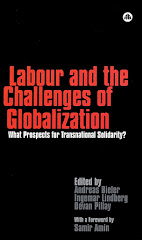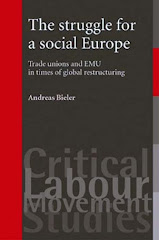 |
| Memorial to Rosa Luxemburg and Karl Liebknecht |
The
Accumulation of Capital (1913) is perhaps Luxemburg’s most scholarly and best-known
work about capitalism and the possibilities of revolution. In order to ensure a
constant increase in the accumulation of surplus value, she argued, capital
relies on bringing non-capitalist space into the capitalist social relations of
production in an outward expansionary dynamic, creating hothouse conditions for
capital accumulation in non-capitalist environments (Luxemburg
1913/2003: 332). She thus comprehended the relentless outward dynamic of
capitalism as a structuring condition, on which the very existence of the
system depended (Bieler
et al 2016).
Here, I want to reflect on a less well
known aspect of Luxemburg’s work. As an active revolutionary within the
international communist movement, she was a close observer of developments in
Russia after the successful 1917 October Revolution. Strongly supportive of
Lenin’s and Trotsky’s Bolsheviks, she became nonetheless increasingly worried
about the undermining of democracy in response to dangers to the revolution
from within as well as outside of Russia. She viewed the dissolution of the
Constituent Assembly in November 1917, the rejection of universal suffrage and
limits to the freedom of the press and right to association as threats to the
full revolutionary potential. ‘The remedy which Trotsky and Lenin have found,
the elimination of democracy as such, is worse than the disease it is supposed
to cure; for it stops up the very living source from which alone can come the
correction of all the innate shortcomings of social institutions. That source
is the active, untrammelled, energetic political life of the broadest masses of
the people’ (Luxemburg
in Hudis and Anderson 2004: 302).
Luxemburg was aware of the practical challenges
of socialism. ‘Far from being a sum of ready-made prescriptions which have only
to be applied, the practical realization of socialism as an economic, social
and juridical system is something which lies completely hidden in the mists of
the future. What we possess in our program is nothing but a few main signposts
which indicate the general direction in which to look for the necessary measures’
(Luxemburg
in Hudis and Anderson 2004: 305). It is here, in charting the unknown
territory ahead that an active and involved populace is essential, empowered by
means of direct democratic participation. Luxemburg was optimistic about people’s
capacities in finding innovative ways forward, provided they were given the
means and opportunities to involve themselves in politics.
Importantly, Luxemburg’s notion of
democracy must not be mixed up with liberal forms of representative democracy. ‘We
have always distinguished the social kernel from the political form of
bourgeois democracy; we have always revealed the hard kernel of social
inequality and lack of freedom hidden under the sweet shell of formal equality and
freedom – not in order to reject the latter but to spur the working class into
not being satisfied with the shell, but rather, by conquering political power,
to create a socialist democracy to replace bourgeois democracy (Luxemburg in
Hudis and Anderson 2004: 305). When in February 1921 Russian sailors,
soldiers, and civilians instigated the so-called ‘Kronstadt Rebellion’ against
Lenin’s and Trotsky’s authoritarian rule, this left-criticism was brutally suppressed
resulting in thousands of deaths. Perhaps, the socialist potential of the
Soviet Union ended as early as 1921.
Luxemburg’s warning against authoritarian rule
and suppression of dissent remains as important today as it was in the early 20th
century. A move towards socialism, talked about, for example, within the British Labour Party at the moment, can only be successful, if dominant forces
are able to cope with criticisms from the left. A move towards socialism can
only be successful, if it is based on concrete mass participation in politics.
Parliamentary rule and dominance by party bureaucracy will never be enough.
Andreas Bieler
Professor of Political Economy
University of Nottingham/UK
Andreas.Bieler@nottingham.ac.uk
Personal website: http://andreasbieler.net
15 January 2019
















No comments:
Post a Comment
Comments welcome!